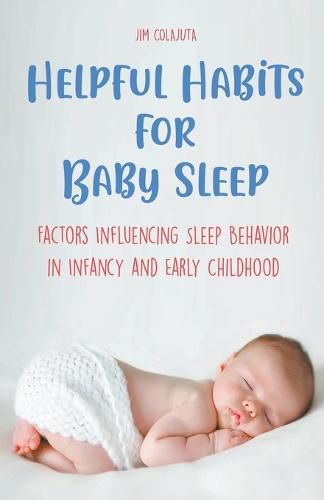Readings Newsletter
Become a Readings Member to make your shopping experience even easier.
Sign in or sign up for free!
You’re not far away from qualifying for FREE standard shipping within Australia
You’ve qualified for FREE standard shipping within Australia
The cart is loading…






This title is printed to order. This book may have been self-published. If so, we cannot guarantee the quality of the content. In the main most books will have gone through the editing process however some may not. We therefore suggest that you be aware of this before ordering this book. If in doubt check either the author or publisher’s details as we are unable to accept any returns unless they are faulty. Please contact us if you have any questions.
Sleep is a nebulous and ubiquitous concept. It is a behavior that all living animals engage in. It draws a lot of attention in the media and research. Sleep is also a crucial component of a child's healthy development and overall well-being. Infant sleep is perplexing and unpredictable, despite its obvious importance. Caregivers frequently express concerns about adjusting to sleep deprivation and persistent sleep variations. Most parents find night waking a very disruptive and depressing pattern of behavior that frequently leads them to seek professional advice or turn to a self-help book or friends for help. Sleeping through the night is one of the most important sleep-related ideas and milestones associated with Western industrialized settings. This accomplishment brings many caregivers relief and rejuvenation after weeks or months of sleep deprivation.
In any situation, getting newborns to acquire sleep habits that represent their cultural context is a significant achievement, and strategies for achieving sleep vary greatly depending on cultural standards and beliefs. While there are definite advantages to getting enough sleep as a child, sleep deprivation is tough to handle. When parents thought their infants' sleep was an issue, they had greater levels of overall parenting stress. Whether actual or perceived, sleep deprivation changed mental well-being and influenced responses to stressful caregiving settings. Sleep is obviously important since it aids in infant growth and development, affects caregivers' overall performance and mental well-being, and affects how new parents view, react to, and interact with their babies.
$9.00 standard shipping within Australia
FREE standard shipping within Australia for orders over $100.00
Express & International shipping calculated at checkout
This title is printed to order. This book may have been self-published. If so, we cannot guarantee the quality of the content. In the main most books will have gone through the editing process however some may not. We therefore suggest that you be aware of this before ordering this book. If in doubt check either the author or publisher’s details as we are unable to accept any returns unless they are faulty. Please contact us if you have any questions.
Sleep is a nebulous and ubiquitous concept. It is a behavior that all living animals engage in. It draws a lot of attention in the media and research. Sleep is also a crucial component of a child's healthy development and overall well-being. Infant sleep is perplexing and unpredictable, despite its obvious importance. Caregivers frequently express concerns about adjusting to sleep deprivation and persistent sleep variations. Most parents find night waking a very disruptive and depressing pattern of behavior that frequently leads them to seek professional advice or turn to a self-help book or friends for help. Sleeping through the night is one of the most important sleep-related ideas and milestones associated with Western industrialized settings. This accomplishment brings many caregivers relief and rejuvenation after weeks or months of sleep deprivation.
In any situation, getting newborns to acquire sleep habits that represent their cultural context is a significant achievement, and strategies for achieving sleep vary greatly depending on cultural standards and beliefs. While there are definite advantages to getting enough sleep as a child, sleep deprivation is tough to handle. When parents thought their infants' sleep was an issue, they had greater levels of overall parenting stress. Whether actual or perceived, sleep deprivation changed mental well-being and influenced responses to stressful caregiving settings. Sleep is obviously important since it aids in infant growth and development, affects caregivers' overall performance and mental well-being, and affects how new parents view, react to, and interact with their babies.